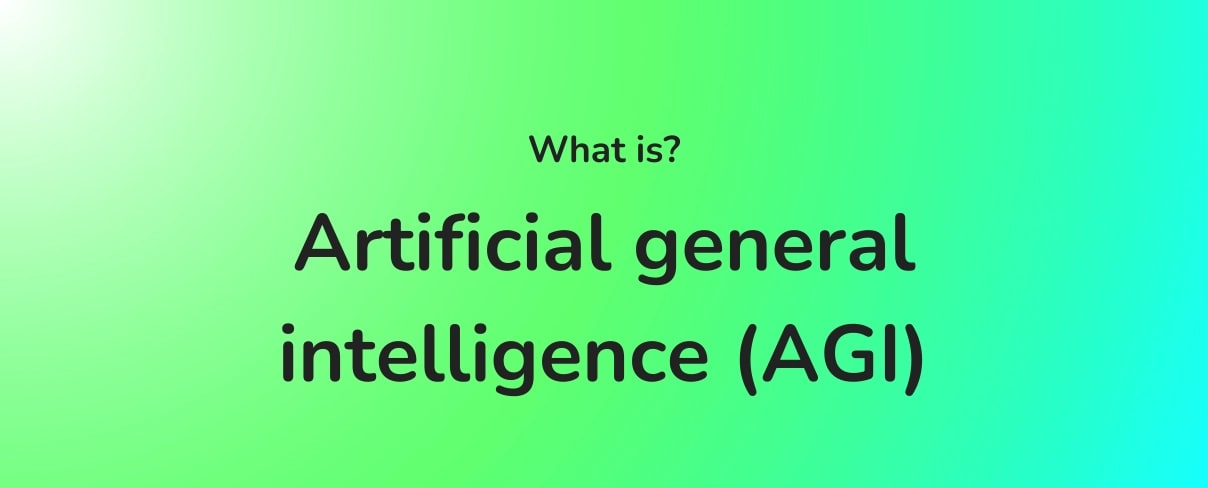What is AGI (Artificial General Intelligence)?
Artificial General Intelligence (AGI) refers to a form of artificial intelligence that possesses the capability to understand, learn, and apply knowledge across a wide range of tasks at a level comparable to human intelligence. Unlike narrow AI, which is designed for specific tasks such as language translation or image recognition, AGI aims to perform any intellectual task that a human being can do.
Key Characteristics of AGI
-
Generalization:
- AGI systems can apply learned knowledge to new and diverse scenarios, demonstrating a high degree of adaptability.
- This contrasts with narrow AI, which typically requires retraining or reprogramming to handle different tasks.
-
Autonomy:
- AGI can operate independently, making decisions and solving problems without human intervention.
- This autonomy is essential for handling complex, dynamic environments.
-
Learning and Reasoning:
- AGI systems have advanced learning capabilities, allowing them to continuously improve and adapt.
- They can reason, plan, and understand abstract concepts, enabling them to tackle novel problems effectively.
-
Human-like Cognition:
- AGI aims to replicate human cognitive abilities, including perception, language understanding, and emotional intelligence.
- This human-like cognition is critical for applications requiring natural interaction and cooperation with people.
Importance of AGI
-
Versatility:
- AGI can be applied across multiple domains, from healthcare and finance to education and entertainment, offering unprecedented flexibility and utility.
-
Innovation:
- The development of AGI has the potential to drive significant technological advancements, solving complex problems that are currently beyond the reach of narrow AI.
-
Efficiency:
- AGI systems can optimize processes and decision-making, leading to increased productivity and reduced costs across various industries.
Challenges in Developing AGI
-
Technical Complexity:
- Building AGI requires significant breakthroughs in algorithms, computational power, and data management.
- The integration of various cognitive processes into a unified system remains a substantial challenge.
- Example: OpenAI's GPT-3, with 175 billion parameters, required an estimated hundreds of petaflop-days for training. you can read more about it here.
-
Ethical Considerations:
- The deployment of AGI raises critical ethical questions, including the potential for misuse, privacy concerns, and the impact on employment.
- Ensuring AGI systems align with human values and ethics is crucial for their safe and beneficial use.
- Example: In 2018, Amazon did discontinue an AI recruiting tool that showed bias against women, as reported by Reuters and other major news outlets.
-
Safety and Control:
- Controlling AGI to prevent unintended consequences is a major concern.
- Researchers are exploring methods to ensure that AGI systems remain aligned with human goals and can be effectively controlled.
- Example: In 2021, researchers demonstrated that AI models could be used to generate highly convincing phishing emails, potentially automating and scaling up cyber attack.
Top use cases of AGI
- Customer Service:
- Accesses vast customer data and combines it with real-time analytics for personalized service.
- Uses tone analysis and emotional intelligence for empathetic and supportive interactions.
- Coding Intelligence:
- Grasps logic and purpose of existing code bases.
- Generates new code based on human specifications, understanding architecture and dependencies.
- Autonomous Vehicles and Transportation:
- Analyzes real-time data from various sensors to identify objects, assess risks, and anticipate changes.
- Understands complex social cues and assists in navigation for safer, more effective routes.
- Healthcare:
- Analyzes medical images, patient records, and genetic data to identify subtle patterns.
- Tailors treatment plans based on a patient's genetic makeup and medical history.
- Education:
- Personalizes learning journeys by analyzing student performance, learning style, and knowledge gaps.
- Adjusts pace and difficulty of material in real-time, providing alternative explanations as needed.
- Manufacturing:
- Optimizes production processes by analyzing data from sensors on the production line.
- Predicts equipment failures before they happen by analyzing historical data and sensor readings.
- Financial Services:
- Analyzes vast datasets including financial news, social media sentiment, and satellite imagery.
- Develops complex trading algorithms and creates more accurate financial models.
- Research and Development:
- Formulates new hypotheses and designs experiments at an unprecedented scale.
- Accelerates scientific breakthroughs across various fields, exploring previously unimaginable frontiers.
Current State and Future Outlook
-
Research Progress:
- While AGI remains largely theoretical, significant strides are being made in foundational research areas such as machine learning, cognitive science, and robotics.
- Notable projects and organizations, including OpenAI and DeepMind, are actively pursuing AGI development.
-
Long-Term Vision:
- The path to AGI is expected to be long and complex, requiring interdisciplinary collaboration and continuous innovation.
- Achieving AGI will likely transform society, unlocking new possibilities and presenting profound challenges that must be carefully managed.
Conclusion
Artificial General Intelligence represents the frontier of AI research, aiming to create systems with human-like cognitive abilities and broad applicability. While the journey to AGI is fraught with technical, ethical, and safety challenges, its successful development promises to revolutionize various aspects of life and industry.
Would you like to incorporate AI in your product? Check out our AI solutions and connect with us.
Explore Our AI Solutions
Discover how our AI technologies can transform your business operations. Feel free to reach out if you need any additional information or further elaboration on specific sections!
